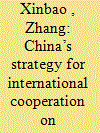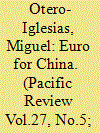|
|
|
Sort Order |
|
|
|
Items / Page
|
|
|
|
|
|
|
| Srl | Item |
| 1 |
ID:
157286


|
|
|
|
|
| Summary/Abstract |
1. On 1 March 2017, the Chinese government released a document entitled “International Strategy of Cooperation on Cyberspace” (ISCC).1 The ISCC comprehensively analyzes opportunities and challenges in cyberspace, advocates “peace, sovereignty, shared governance, and shared benefits” as the basic principles of international exchange and cooperation in cyberspace, establishes six strategic goals, namely, safeguarding sovereignty and security, developing a system of international rules, promoting fair internet governance, protecting legitimate rights and interests of citizens, promoting cooperation on digital economy, and building platforms for cyber culture exchange. Accordingly, nine specific plans of action to promote international cooperation in cyberspace were formulated.
|
|
|
|
|
|
|
|
|
|
|
|
|
|
|
|
| 2 |
ID:
135075


|
|
|
|
|
| Summary/Abstract |
The aim of this paper is to analyze China's strategy in relation to the euro. The first section summarizes China's active support to the single currency since its creation up to the first phase of the current Eurozone debt crisis. It shows how China has used a two-pronged approach. It has developed a public campaign in favor of the euro, especially when the market sentiment has been bearish on the single currency, and it has continued to be an active player in the European sovereign debt markets. The second part explains why China has been so supportive. Beijing wants to move away from dollar hegemony and thus it favors a tripolar monetary system based on the US dollar, the euro and the Chinese renminbi (RMB). With this aim, and despite the crisis, China has continued to diversify its foreign reserves into the euro making it by now ‘too important to fail’, not only because China holds roughly $1 trillion in euro-denominated assets, but also because for China the Eurozone is a crucial market and an important strategic counterweight to US dominance in world affairs. Finally, the third part focuses on how by the end of 2011 China switches to a more cautious approach due to the difficulty involved in rescuing the Eurozone. Domestic pressures, public outcry in Europe against being saved by China, the unwillingness of the European leaders to enter into strategic bargaining and Germany's strategy to use sovereign bond spreads as a market mechanism to create ‘more Europe’ have convinced policy-makers in Beijing to keep a lower profile while making sure the value of the euro remains stable.
|
|
|
|
|
|
|
|
|
|
|
|
|
|
|
|
|
|
|
|
|